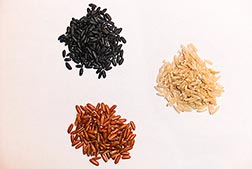| Read the magazine story to find out more |
|
|
Colored Rice May Brighten the Menu for Diabetics in the Future
July 10, 2017
When it comes to healthful foods, fruits, vegetables and whole grains are some choices that come to mind. But how about rice—colored rice that is? Agricultural Research Service (ARS) scientists are investigating the potential of brown, purple and red rice in managing diabetes.
Rice bran contains bioactive compounds—extra nutrients that occur in small amounts in foods. Studies have shown that these compounds have the potential to promote human health.
A health issue of great concern is diabetes—a disease that affects how your body uses blood glucose (sugar). Today, nearly 30 million Americans and 422 million people worldwide are affected by diabetes.
ARS chemist Stephen Boue and his colleagues in New Orleans, Louisiana, and Stuttgart, Arkansas, examined the impact of brown, red and purple rice bran on mice fat cells as a model for developing methods to help with diabetes management. They studied the colored rice bran extracts' ability to stimulate glucose uptake in mice fat cells.
Glucose uptake is critical for people with diabetes, because their bodies are unable to produce enough insulin, which causes elevated glucose levels in the blood. Without proper medical care, diabetes can lead to heart attack, stroke, blindness, kidney failure and nerve damage.
The ARS study, published in the Journal of Agricultural and Food Chemistry, showed a significant increase in glucose uptake in mice fat cells exposed to colored bran extracts. Glucose uptake nearly tripled in mice fat cells exposed to red rice bran extracts and more than doubled with purple rice bran extracts, according to Boue, who works at ARS's Southern Regional Research Center.
While these results showed promise in using red and purple bran extracts to regulate glucose uptake in mice fat cells, Boue noted that additional research with humans is needed to verify the same positive effect.
Read more about this research in the July 2017 issue of AgResearch magazine.
For more information contact Sandra Avant, ARS Office of Communications.
The Agricultural Research Service is the U.S. Department of Agriculture's chief scientific in-house research agency. Daily, ARS focuses on solutions to agricultural problems affecting America. Each dollar invested in agricultural research results in $17 of economic impact.

